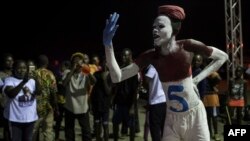Three Ghanaian opposition candidates who were disqualified from running in next month's presidential and parliamentary elections say they are concerned the vote is unlikely to be fair or credible.
Edward Mahama of the People's National Convention (PNC), Papa Kwesi Nduom of the Progressive People's Party (PPP) and former first lady Nana Konadu Agyeman Rawlings of the National Democratic Party (NDP) voiced their concerns about the December 7 vote recently in a joint statement. They blamed the Electoral Commission for what they called poor prevailing conditions that could undermine the integrity of the polls.
"If the rules of the game can be twisted and turned by the referee as and when it pleases, can we then say that the elections will be free and fair, when we do not know what illegal steps will be taken in the process leading up to the elections? Some of our parliamentary candidates have been disqualified without due process," they said.
'Recipe for chaos'
"We are also aware that the EC chair has announced the intention to recount the ballots depending on some circumstances which are not backed by law. We believe this is another tool to be deployed in favor of a particular candidate if the results do not go in his favor," they said. "This attempt to change the results through a purported recounting is a recipe for chaos and civil disobedience."
Eric Dzakpasu, a commission spokesman, disagreed. In an interview with VOA, he said the commission would not be deterred from carrying out its constitutional mandate, which he said was to organize next month's elections.
"The Electoral Commission is focused, and it is applying the rules and regulations of the elections to the letter," he said.
PNC national chairman Bernard Mornah told VOA the commission erred in its decision to disqualify the three presidential candidates, saying the move negatively affected their campaigns.
After the commission ruled that the three candidates failed to meet required stipulations to run, the decision was challenged. Ghana's Supreme Court recently ruled in favor of the candidates, saying their applications should be reconsidered.
Financial, logistical costs
Mornah described the disqualifications as unacceptable. The decisions "took a toll on our presidential candidate, particularly emotionally, financially and in logistical mobilization," he said.
"When they were disqualified, what it did was that it derailed their campaign agenda, and eventually it did not give them the kind of opportunity that they needed to get among the electorate," Mornah said. Even though the candidates' applications were restored for consideration, "the electoral commission did not extend the time for the campaign. And therefore, the injury that has been caused by the disqualification obviously affects the transparency and indeed about all the credibility of the election."
Commission officials said they were continuing to engage the political parties to help resolve their concerns before the elections.
But Mornah said the commission "has become so intransigent."
Advertising time
"There are many decisions that the Electoral Commission has taken, particularly in 2016, without recourse to the political parties," he said, pointing as an example to the establishment of a filing fee without the knowledge of the political parties. "We feel that the Electoral Commission having the power of independence does not mean that consultations should be thrown to the dustbin. And in these instances, the Electoral Commission has shown little faith in consultations, and we are disturbed that such can lead to further litigation and these litigations can derail our forward march as a nation."
Mornah also voiced concern that the ruling NDC appeared to have bought a majority of air time in both the independent and state media houses, making it difficult for minor parties to get their message out.
Supporters of the NDC called on other parties to do what they could to get their messages out, instead of blaming the ruling party.




